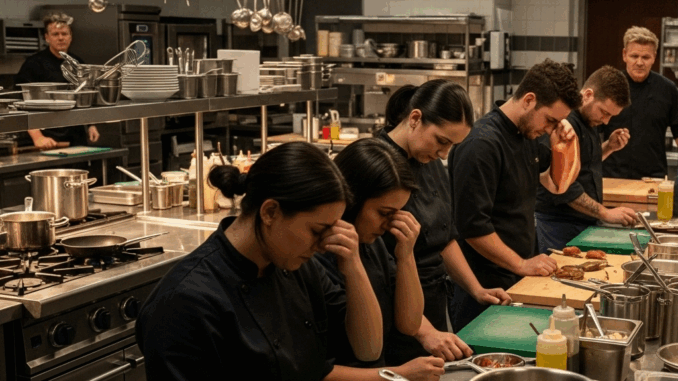
The glamorous, high-stakes world of Gordon Ramsay’s Hell’s Kitchen often presents a fiery, competitive spectacle on-screen — but former contestants reveal that the reality behind the scenes can be far more taxing. In candid interviews, ex-participants have disclosed that the intense pressure, relentless scrutiny, and emotional rollercoaster of the show have led many to experience depression and seek professional therapy after filming wrapped.
According to insiders, the grueling filming schedule is only part of the challenge. Contestants are thrust into a high-pressure environment where every action, mistake, and reaction is captured by cameras and broadcast to millions. “It’s not just cooking under pressure,” one former participant explained. “You’re constantly aware that every move you make is being judged by the chef, your peers, and the audience at home. It’s exhausting mentally and emotionally.”
The emotional strain, insiders say, often lingers long after the cameras stop rolling. Former contestants describe sleepless nights, anxiety, and feelings of isolation. Some have reported that the intense criticism and humiliation on-screen — a hallmark of Ramsay’s signature style — triggered lingering self-doubt and heightened stress. “Even though you expect the tough criticism, seeing it played back for millions of viewers is a different experience,” another ex-contestant revealed. “It sticks with you, and some people need professional help to process it.”
Mental health professionals note that reality television can pose unique psychological challenges. The combination of public exposure, high stakes, and competitive tension creates an environment ripe for emotional strain. “Contestants are put in extreme situations,” said a therapist specializing in media-related stress. “They’re often unprepared for the intensity, the scrutiny, and the resulting anxiety or depression. Therapy is sometimes necessary to help them regain balance.”
Former participants also highlighted the lack of preparation for the emotional toll. While most shows offer training in cooking, competition, or camera presence, few provide guidance on handling the psychological stress of constant observation, intense rivalry, and public judgment. “We were trained to cook and compete,” one source explained, “but no one prepared us for the emotional aftermath of being humiliated in front of millions.”
Social media amplifies the pressure further. Contestants are often scrutinized not only by viewers but also by online communities, where fans and critics dissect every episode and every behavior. Some former participants noted that online criticism compounded the stress, with trolls and harsh commentary exacerbating feelings of inadequacy or failure. “Even after the show ended, I couldn’t escape it,” one ex-contestant said. “Seeing posts about you, both good and bad, every day takes a toll.”
The revelations shed light on a less glamorous aspect of reality TV production. While audiences focus on the drama, competition, and entertainment value, contestants face a very real human cost. Insiders suggest that the producers are aware of these pressures and, in some cases, provide support, but the responsibility ultimately falls on participants to seek help if they struggle with mental health challenges.
Some former contestants have become advocates for mental health awareness in the reality TV world, sharing their experiences to encourage others to prioritize well-being. “I want people to understand that it’s okay to struggle after a show like Hell’s Kitchen,” one ex-participant said. “It’s normal, and getting help is important. No amount of fame or exposure is worth your mental health.”

The conversation has also sparked broader discussions about the ethical responsibilities of producers and networks. Critics argue that while dramatic criticism and humiliation make for compelling television, there should be structured support for contestants both during and after filming. “Shows have a duty of care,” a media ethicist explained. “Entertainment should not come at the cost of contestants’ mental health.”
Fans, meanwhile, have reacted with a mixture of shock and empathy. Many express surprise that the show’s pressure could have such lasting effects, while others commend former contestants for speaking out and advocating for mental health awareness. Online forums have seen waves of discussion about the psychological impact of reality TV, with viewers sharing personal stories and offering support to those who have participated in high-pressure shows.
For Gordon Ramsay and the Hell’s Kitchen brand, these revelations pose both a challenge and an opportunity. While the show’s dramatic tension and fiery confrontations are central to its appeal, acknowledging the psychological toll and supporting contestants’ mental health could enhance the franchise’s reputation and demonstrate a commitment to responsible production practices.
Ultimately, the former contestants’ accounts serve as a sobering reminder that behind the fiery kitchens and televised drama, real people face real pressures. The intense environment of Hell’s Kitchen, while entertaining for audiences, can lead to lasting emotional and psychological consequences, making mental health support and awareness an essential consideration for both participants and producers alike.